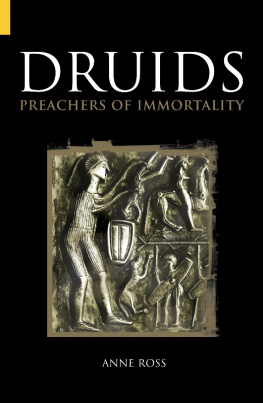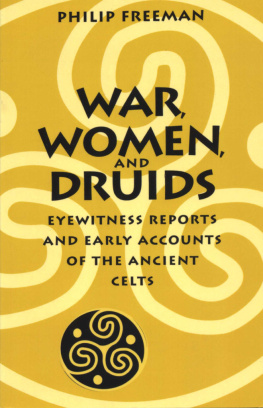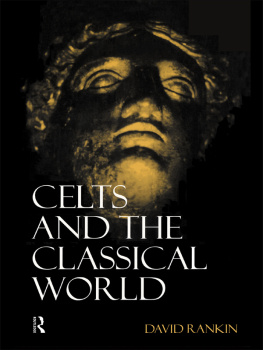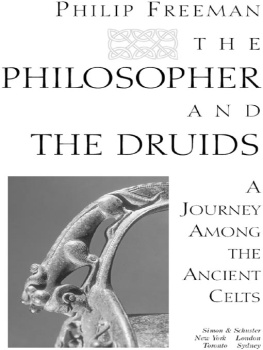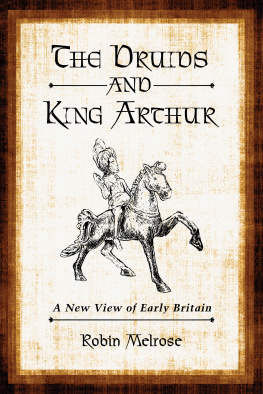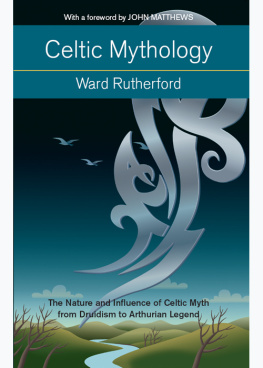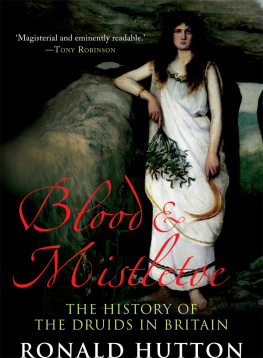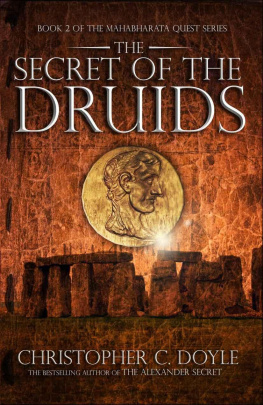DRUIDS
PREACHERS OF IMMORTALITY
DRUIDS
PREACHERS OF IMMORTALITY
ANNE ROSS

For my husband
Richard W. Feachem
First published in 1999
The History Press
The Mill, Brimscombe Port
Stroud, Gloucestershire, GL5 2QG
www.thehistorypress.co.uk
This ebook edition first published in 2013
All rights reserved
Anne Ross, 1999, 2013
The right of Anne Ross to be identified as the Author of this work has been asserted in accordance with the Copyright, Designs and Patents Act 1988.
This ebook is copyright material and must not be copied, reproduced, transferred, distributed, leased, licensed or publicly performed or used in any way except as specifically permitted in writing by the publishers, as allowed under the terms and conditions under which it was purchased or as strictly permitted by applicable copyright law. Any unauthorised distribution or use of this text may be a direct infringement of the authors and publishers rights, and those responsible may be liable in law accordingly.
EPUB ISBN 978 0 7509 5248 4
Original typesetting by The History Press
CONTENTS
ACKNOWLEDGEMENTS
I would like to record my debt of gratitude to my family and friends for all their encouragement down the years, which cannot be fully expressed in this brief statement. I would, however, wish to mention my deep indebtedness to my daughter, Berenice, for all her help in every way, and the numerous hours she has spent working with me in preparing the book for publication. Charles and Richard have both made their own, singular contributions, and to Richard I am especially indebted for his meticulous line drawings and maps. I would also like to record my gratitude to my publisher, Peter Kemmis Betty, for his kind consideration and patience.
PREFACE
T he prehistory, protohistory and history of much of Europe west from the Urals and south from Prussia exhibits an unbroken series of material developments moving steadily onward from the establishment of the settled, rather than the nomadic, way of life. Evidence of this movement is seen in structures dwellings and tombs and in the progression from the use of stone through that of bronze to iron, in the manufacture of weaponry and other material objects.
While material changes took place steadily, the people remained much the same, judging by their skeletal remains.
Up to the 1960s material changes were generally accounted for by migration. Since then, however, this concept has been superseded by a realisation that there was no need for it; and the migration theory is no longer heard except in uninformed echo.
In the first millennium BC the Greeks called those people Keltoi who used a certain language, the origin of which lay in the distant past. Those who lived in the region in which any version of this language was used were Celts, although they may well not have known it. Which people among the British before the seventeenth century, for example, would have called themselves Europeans? That word is first recorded in use in 1603 and, as meaning a native of Europe, in 1632.
Likewise, the peoples who lived alongside the Celts, but spoke their own languages, were not Celts. That is not to suggest, though, that they were any different in general behaviour or appearance from their Celtic neighbours.
In conversation with an Hungarian Museum Director from Budapest I happened to make reference to the Celts in central Europe. He instantly replied with great enthusiasm: In Hungary we are all Celts! Soldiers come, heroes fall but the people go on!
FOREWORD
The Celtic Languages
T he Celtic languages which belong to the so-called Indo-European group of related tongues are very ancient, as is the entire Celtic tradition. They are divided by philologists into two main groups; the first of these is known as P-Celtic or Brythonic (Gaulish, Celt-Iberian, Lepontic (N. Italy) and British, now known as Welsh). This latter group includes Breton, spoken in Brittany, the terrain of the powerful Gaulish tribe the Veneti, who were subjugated by the Romans in 56 BC. In the sixth and seventh centuries AD incomers from south-west Britain, speaking Welsh, resettled the region and established the foundations of modern Brittany (22). It is likely that native Veneti still remained and intermarried with the incomers.
The second group of Celtic origin is known as the Q-Celtic or Goidelic group, spoken by the Gaels. There is evidence that both P- and Q-Celtic were at one time used on the continent as place-names and deity names suggest. Moreover, the famous Coligny calendar employs both the P and Q forms. Ireland is named after its eponymous goddess riu and the genitive form of the name, Erin, came into common usage. Gaelic was also spoken in the Isle of Man and became the language of the North Western Highlands and Islands of Scotland from the fifth century AD.
The Picts of Scotland and probably Northern Ireland used a different language, possibly non-Indo-European in origin, although both Goidelic and Brythonic elements have been identified in their inscriptions and appear in their king-lists.
The Celtic languages changed and were modified with the passage of time and it can be confusing when we find that names are spelt in different ways according to the dates of the texts; for example, the divine hero can be spelt Fionn or Finn; the goddess Medb is spelt Maeve, and so on. It is a specialist subject and the reader is advised to consult such scholarly works as Professor Glanville Prices brilliantly edited Encyclopedia of the Languages of Europe (Blackwell, Oxford, 1998).
The problems of attempting to reconstruct an early society by way of linguistic evidence alone need not be emphasised and we are extremely fortunate to have the support of todays highly sophisticated archaeological techniques.
INTRODUCTION
They have philosophers and theologians who are held in much honour and are called Druids; they have sooth-sayers too of great renown who tell the future by watching the flights of birds and by observation of the entrails of victims; and everyone waits upon their word.
(Diodorus Siculus, Histories, V, 31, 2-5)
The early Celtic world:
its archaism, social structure and religious attitudes
T he main sources for any study of Celtic origins and subsequent history are the inevitable travellers tales which contain some items of great interest; however, it must be noted that they are of unequal quality and value. Nevertheless, they provide us with some of our earliest glimpses into a rapidly evolving Celtic world. Amongst these, of course, we must rate the prolific, sometimes colourful, and perhaps not always exact observations of the ethnographers. Used in conjunction with the evidence for Celtic place and river names, some of which (especially the river names) must be of very great antiquity, they do provide the framework at least, into which we may fit the pieces of evidence for the early Celtic world. Also there are the comments of the Celtic world looking in upon itself the Celts through Celtic eyes. Finally, we depend for much information from the writings of the classics, first Greek and then Roman:
Among all the Gallic peoples, generally speaking, there are three categories of men who are held in exceptional honour; the Bards, the Vates, and the Druids. The Bards are singers and poets; the Vates, diviners and natural philosophers; while the Druids, in addition to natural philosophy, study also moral philosophy. The Druids are considered the most just of men, and on this account they are entrusted with the decision, not only of the private disputes, but of the public disputes as well; so that, in former times, they even arbitrated cases of war, and made the opponents stop when they were about to line up for battle, and the murder cases in particular, had been turned over to them for decision. Further, when there is a big yield (of criminals for sacrifice) from these cases, there is forthcoming a big yield from the land, too, as they think. However, not only the Druids, but others as well, say that mens souls, and also the universe, are indestructible, although both fire and water will at some time or other prevail over them.
Next page
